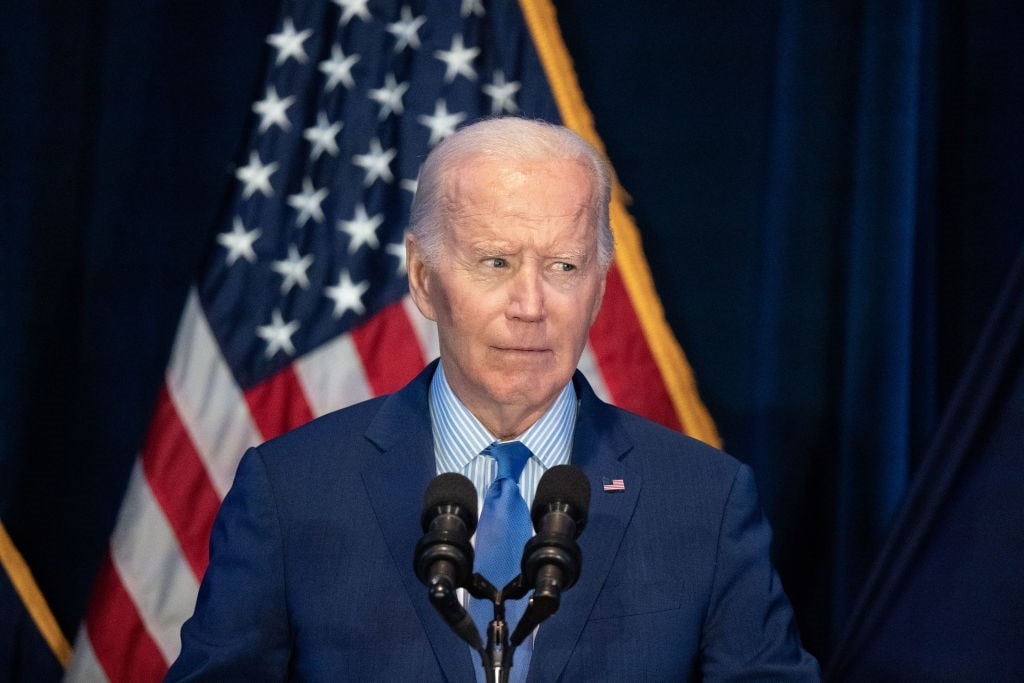Four months ago, Hamas terrorists – backed by Iran — invaded southern Israel. In a murderous rampage, they ransacked Israeli homes, killed old men, teenagers, children, and babies and raped women, leaving their mutilated, bloodied bodies for survivors to find. Thirty of the terrorists’ victims were Americans. That was the horror of Oct. 7. The world was shocked but not confused. Iran was behind the massacre.
The attack left 1,300 dead, galvanizing the Israelis with a sense of vengeance not to be denied. On Oct. 18, President Joe Biden addressed them from Tel Aviv to assure that the American people were in full support. “As long as the United States stands – and we will stand forever — we will not let you ever be alone,” Biden declared. The president looked into the television camera with piercing determination and stated emphatically, “And my message to any state or any other hostile actor thinking about attacking Israel remains the same as it was a week ago: Don’t. Don’t. Don’t.”
Iran Continues to Cause Trouble
 But time and world events have a habit of eroding even the best of intentions. The administration’s ironclad support appears to be waning as Iran continues to foment trouble in the region. A day after the Oct. 7 butchery, The Wall Street Journal revealed, “Iranian security officials helped plan Hamas’s Saturday surprise attack on Israel and gave the green light for the assault at a meeting in Beirut last Monday, according to senior members of Hamas and Hezbollah, another Iran-backed militant group.”
But time and world events have a habit of eroding even the best of intentions. The administration’s ironclad support appears to be waning as Iran continues to foment trouble in the region. A day after the Oct. 7 butchery, The Wall Street Journal revealed, “Iranian security officials helped plan Hamas’s Saturday surprise attack on Israel and gave the green light for the assault at a meeting in Beirut last Monday, according to senior members of Hamas and Hezbollah, another Iran-backed militant group.”
Three days after the attack, John Kirby, spokesman for the National Security Council, told the White House press corps, “So, on Iran, let me start by saying that no question that there’s a degree of complicity here, but Iran has been supporting Hamas for many, many years — tools, training, capabilities — certainly rhetorically but in more much more tangible ways than that.” Since then, the White House and the Pentagon have reinforced the same talking point about Iran’s involvement in more than 150 assaults on US military outposts and bases in Iraq, Syria, and Jordan.
In an Oct. 24 Pentagon press corps briefing, Defense Department Press Secretary Brig. Gen. Patrick Ryder explained, “I think we’ve been pretty clear on this, and my colleagues at the White House yesterday talked about this as well. We know that the groups conducting these attacks are supported by the IRGC and the Iranian regime.” So, why is the Biden administration so fearful of taking the fight to Tehran?
The Source of the Trouble
Two explanations account for Biden’s timidity in going after the source of conflict in the Middle East. First, the president of the most powerful nation in the world sees most, if not all, events through a narrow political lens. John Bolton, former ambassador to the United Nations and US National Security Advisor 2018-19, told Newsweek:
“I think a big part of the problem here is [Iran’s leaders have] been watching this for some time, and they see a Biden administration absolutely paralyzed with fear of the political consequences for the president this November because of what Israel’s doing to Hamas. It’s fearful of a wider war or fearful of escalation. That’s reason for Iran to push ahead … [the White House] is sort of genetically unable to point the finger at Iran as responsible for all this.”
The Biden administration seems to have a limited understanding of how to control the results of actions it may take and instead chooses inaction toward Iran as the low-risk political solution. That is precisely what Iran is counting on, since Tehran has a long-term objective for the Middle East: get the United States out.
A second reason for the president’s fear is that Biden and his national security team have a myopic grasp of power projection. The Pentagon rapidly deployed two aircraft carrier strike groups to the Middle East following the Oct. 7 attack on Israel. That was impressive. But the Defense Department then used that formidable capability to irritate Iran-backed Houthis in Yemen and Tehran-sponsored proxies in Iraq. Meanwhile, the administration continues to shout from the rooftops that the United States does not want a wider war with Iran. Why not?
Biden may be afraid that if the American military strikes Iran, Russia will intervene. That’s a legitimate concern. In late October, a Reuters dispatch quoted Russian President Vladimir Putin, who warned, “Further escalation of the crisis is fraught with grave and extremely dangerous and destructive consequences. And not only for the Middle East region. It could spill over far beyond the borders of the Middle East.” That declaration apparently sent shivers up the collective national security team’s spines.
But threats from Putin are aimed more at ensuring continued shipments of Iranian-produced attack drones needed for his unprovoked war on Ukraine. Russia has more on its plate than it can handle, and with no forces of any consequence in the Gulf region, the Russian president’s bullying may count as only modestly fearsome. The United States should not fear the consequences of holding Tehran accountable. As of now, Iranian mullahs seem quite confident they are safe from a direct US response. Perhaps it’s time for Biden to show Iran that such certitude is misplaced.
The views expressed are those of the author and not of any other affiliation.




